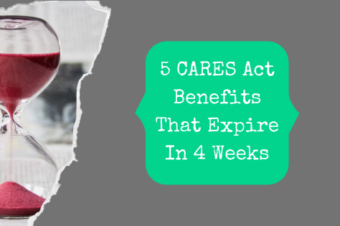Clergy and religious workers are now eligible for Public Service Loan Forgiveness (PSLF) based on their religious work. To be eligible, the loans must still be direct, 120 payments must be made, and the borrower must work for a qualifying employer.
Making Sense of the Advanced Child Tax Credit Payments
If you have kids, there’s a good chance that you received some money from the IRS in the last couple of days. It is a part of the American Rescue Plan legislation that was passed in March, an advanced payment of your 2021 child tax credit. Along with money in people’s pockets, it has caused an incredible amount of confusion.
I honestly don’t think I’ve ever seen so much confusion surrounding something that so broadly affects Americans and has had good press coverage. As pastors, you’re used to confusing rules (seriously, dual-status taxation?!?), but this is widespread among the general population, not a unique group like ministers. So, I decided to spell it all out for you today. I’ve seen all kinds of questions regarding how it will affect taxes in the spring, what to do with the money, and if people should opt out of the payments. Let’s start from the beginning.
What is the Child Tax Credit?
If you make under a certain amount of money ($400,000 for a married couple) and have qualifying children, you get a break on your taxes. You basically get a discount. After calculating your tax liability based on your income, etc. you get to knock a couple thousand dollars off your bill. Pretty cool, huh? Even better, some of that tax credit is refundable, meaning they’ll give you the money even if you don’t owe any taxes.
Child Tax Credit Changes for 2021
They made some changes to the Child Tax Credit (CTC) in the American Rescue Plan. The changes only apply to the 2021 tax year, though some people want to make them permanent. The biggest changes were increasing the amount and a provision to pre-pay some of it. This is a good article if you want to read more about the changes.
The prepayment part is what this blog post is about. They decided that instead of making people wait until they file their tax return to receive the benefit of the higher amount, they would give them some ahead of time, starting on July 15.
How the Prepayment is Calculated
How much did you get on July 15? The IRS calculated the payments as if they were paying out the entire CTC over the course of the year. But they’re only paying over half the year, so only half of the credit is being pre-paid.
For example, let’s say you have a 10-year-old and a 12-year-old, so for 2021 tax purposes they are worth $6,000 total. If you divide that by 12 months, you would get $500 a month. You will only receive payments from July to December, for a total of $3,000. The other $3,000 you will subtract on your tax return, the way you usually do it.
Why Wouldn’t You Want the Prepayment?
While the government is sending out this money to try to help people, not all of us want it. Personally, as a self-employed person, I have to pay quarterly estimated taxes just like a lot of you do (even though you’re not self-employed, it’s that dual-status taxation again!). I don’t want the government sending me money because I just have to turn around and send it back to them.
Also, a lot of people with steady income have it figured out so that they pay just the right amount and don’t owe or have a refund when they file their tax return. These prepayments can mess things up in that situation.
Let’s look again at our above example, the people who got $3,000 of prepayments and took $3,000 off on their tax return. Normally, they would not have gotten any prepayments and instead taken $4,000 off when they filed their taxes (the usual value of 2 kids). When they go to file next April, they will only be able to take $3,000 off (since they already got the other money) and will therefore end up owing the IRS $1,000. I hope they’re setting some of those payments aside to give back in April!
How to Opt Out of the Prepayments
Of course, the IRS recognizes that not everyone wants the CTC paid in advance. They have provided a way to opt out. You can go to this website to check your eligibility and also unenroll from payments. I went in and unenrolled. It was easy for me because I already have an account with the IRS that I use to pay my quarterly estimated taxes.
I wasn’t able to completely unenroll, though. I am married, so I was only able to unenroll from half of the payment. To unenroll for the full amount, my husband needed to unenroll also. And he tried. Boy, did he try.
He submitted so many documents and so much information to prove his identity, I almost thought it was a scam. Finally, they told him that they were unable to confirm his identity and he would have to speak to an identity specialist with a webcam on and sent him to a queue with a 3 hour wait (which had increased to 3 ½ hours 45 minutes later). He never made it far enough to opt out. It simply wasn’t worth the effort. I would have thought he was a unique case or it was a user error, except I have heard from clients and others that also had a terrible time trying to unenroll. (And after all that we got a letter saying we would receive the full amount!)
So, technically you have the ability to unenroll from the payments, but whether or not you can actually do it is still to be determined. It has to be done three days before the first Thursday of the next month that you’re scheduled to get a payment by 11:59 pm Eastern time. In case that’s as clear as mud, this page has a chart with exact dates. Good luck!
How the Prepayment Affects Your 2021 Taxes
Now you can see why there’s so much confusion, can’t you? Not even the deadline to opt out is clear and simple! The major point of confusion for most people, though, is the effect it will have when they file their tax return next April.
What impact will it have?
The prepayments will not affect your tax liability. That is how much money you actually have to give to the government. The amount of your income that you keep in the end is not affected by the prepayments.
However, it likely will affect your tax return or the amount you have to pay. Those are both different from your tax liability. They are just what’s left of your tax liability after subtracting out the money that has been withheld from paychecks or paid as quarterly estimated payments throughout the past year. A big refund doesn’t mean you paid less in taxes, it just means you prepaid too much. The total amount you pay the IRS is the same whether you pay too much ahead of time and get a refund or don’t pay enough and have to pay more with your tax return.
Well, I hope that helps to clear up some of your questions. I’m sure I’ve missed some, so go ahead and leave them in the comments and I’ll get back to you!












